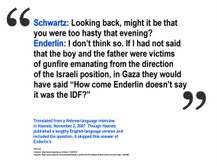
One of the more scandalous episodes of the Al Durah Affair came about after the judges saw the rushes and Karsenty won his appeal, much to the astonishment of the journalistic community who, under the aegis of Jean Daniel of Le Nouvel Observateur, put together a petition in his support. Below is a discussion of this development from an earlier post on Public Secrets (“they stage stuff all the time”) and Journalism.
In it I quote a remarkable response to Ha-aretz reporter Adi Schwartz’ question to Enderlin, “Why say ‘target of fire from the Israeli position” [when you didn’t at the time have any evidence], to which Enderlin responded, “what would they say in Gaza if I didn’t report that the Israelis killed him?” This is an astonishing quote, whose discussion I’ll delay to after the discussion of the “Nouvel Obs Petition.”
But then the “friends of Charles” did something remarkable and remarkably foolish. They put up a letter of support for their colleague that bemoaned the “campaign of hatred and vilification” that had dogged his steps for lo! these seven years… accusing him of a hoax when he told the world that the boy was killed by fire coming from the Israeli position. The court’s decision, they declared, surprised and worried them: surprised, because the court “granted the same credibility to Karsenty,” a mere civilian, as it had to Enderlin, the veteran reporter “known for the seriousness and rigor of his work, who exercises his profession in sometimes difficult conditions”; worried, because the court’s decision “gives a ‘permission to defame’ journalists, which would permit anyone, in the name of ‘good faith’ and ‘the right of free criticism,’ to strike with impunity at the ‘honor and reputation of information professionals.’” This, they concluded, coming “at a time when the freedom of action of journalists is the object of repeated attacks,” would undermine “this fundamental principle, pillar of democracy” and therefore they “renew our support and solidarity with Charles Enderlin.”
The text of this petition, signed by many, is as revealing as the Cristiano letter both in its complete indifference to the public secret that the Cristiano letter revealed about the systematic intimidation of the correspondents in the field. Perhaps that’s what the petition meant by “difficult circumstances” that their “veteran reporter” sometimes operated in. But somehow (unless one posits deliberate deceit), it could not occur to them that their friend was systematically misrepresenting the “terrain” he knows so well, that he would misreport events because “what would they say in Gaza if I didn’t report that the Israelis killed him?”
On the contrary, the petition was written and signed by people who showed no interest in the evidence, who believe that their colleague should be given superior credibility because he is their colleague. And they clearly think that freedom from criticism by their readers guarantees their freedom of speech. It would be hard to imagine a more blatant expression of a privileged corporatist mentality redolent of the ancien régime. Ben Dror Yemini compares them to the “anti-Dreyfusards, who also stubbornly clung to the first version.”
And they just reared their ugly head again, the usual lethal suspects – journalists, photographers, and “Human Rights” NGOs, who call themselves the Vultures on Facebook, in response to the Kuperwasser Commission’s threat to their axiomatic belief: Al Durah is true. On rekaB Street.
And all this operates within the Augean Stables, whose parameters are
- Palestinian intimidation (part of a larger context of the willingness of the “weak” in asymmetrical warfare to resort to violence)
- journalistic self-esteem/honor-shame concerns about being “looking honorable”
- advocacy for the underdog to the point of underdogma as a resolution to the dilemma.
Here Enderlin reveals that in the journalist’s daily and constant struggle navigating between loyalty to his sources, and loyalty to his audience, professional scruples of the most elemental sort – heavy accusations need heavy corroborating evidence – answered to the people of Gaza and neither to Israel, nor even to his professional standards. And the ease with which both he expresses it and Adi Schwartz accepts it, illustrates just how encrusted these bad attitudes had become.
Apparently, the Haaretz translators of this article understood that this comment was too revealing for the rest of the world, and cut the key phrase in its English version:
A.S.: In hindsight, is it possible that you were too hasty that evening?
C.E.: I don’t think so. Besides, the moment I saw that nobody was asking me anything officially, I started feeling more strongly that the story was true.
Daniel Leconte was quite indignant about the public secret of the staging: “You [France2] may know it [that staging happens all the time], but the public doesn’t. But then, reportedly, Jacques Attali told him to stand down and both he and Denis Jeambar used the excuse of Juffa’s leaked report of their encounter to bow out. Two more Zolas that never happened.
Share
